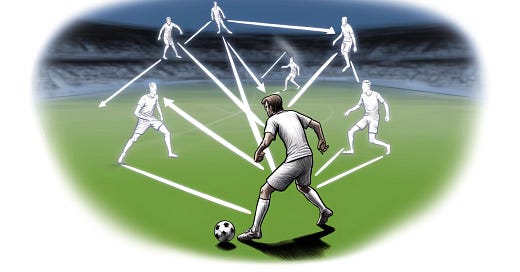
Have you ever wondered why we give so much credit to goal scorers? Fans, sports journalists, and pundits usually value attacking players the most. Whether it is the Ballon d’Or, the FIFA Player Award, newspaper “player of the year” lists, “transfermarkt” statistics, or Instagram followers, we obsess over attacking players.
The Spotlight on Scoring
Attacking players, in particular top goal scorers, are usually the “players of the match”; they are the ones considered the most central for their teams. Lionel Messi and Cristiano Ronaldo are the most obvious examples, but similar importance is ascribed to Kylian Mbappé, Erling Haaland, Harry Kane or Vinícius Júnior.
That always struck me as odd. Football is a team sport where all 11 players perform central functions and where the coach and a huge support team all contribute. Why do we fixate so much on the players who score?
Beyond the Goal: The Unseen Playmakers
The importance that we ascribe to goal scorers is like claiming that coffee is created by pressing the "brew button" of a coffee machine, that food grows on supermarket shelves, or that a car works by flooring the accelerator.
That is, we focus on the last piece or effect of a complex mechanism but overlook all prior causes and the overall design that led to the last effect, i.e., the goal.
Things central to football, such as build-up, positional play, pressing, anticipation of passing and paths, as well as overall coordination, are difficult to perceive and understand, particularly if you focus constantly on the movement of the ball, as you are forced to, if you watch a match on TV.
The Cognitive Science of Watching Football
So, we focus instead on the last player and action before a goal is scored, perhaps except for the player providing the “assist” directly leading to the goal—a phenomenon that might be a variety of the psychological shortcoming that cognitive scientists call the “recency effect”.
Although many of us watch a lot of football, we are surprisingly bad at understanding the game at a higher level. Regarding football, the lack of knowledge seems pervasive. Most players, “pundits,” and journalists seem utterly clueless, usually reducing everything down to motivation—an issue that Philipp Lahm has recently criticized in particular with regard to German football. Only a few excellent coaches and their staff seem to know what is going on.
The Beautiful Game as a Reflection of Society
But this issue is not restricted to football. Our inability to understand things contextually, to grasp causality relations properly, and to discern perceptually what is going on pertains to many other areas of life, such as the sphere of politics or most things regarding economic matters.
Likewise, as for football, we come to believe in many other areas of life what pundits and “experts” tell us, although right in front of our eyes, a different or more complex picture unfolds.
In that sense, football is a microcosm that helps us understand other areas of life.
Good coaches keep their knowledge of the game a secret. That is their good right—their knowledge is their unique skill or competitive advantage in a game. However, politics and economics are not a game.
The good news is that better thinking can be learned. We can learn how to think complexly and grasp causality better. How that can be learned is unfortunately a topic for a different article.
If you enjoyed this article, please consider sharing it with your friends or on social media. Your support would be greatly appreciated. Thank you!
© 2024 Alexander Jeuk for the text. For image see caption.



